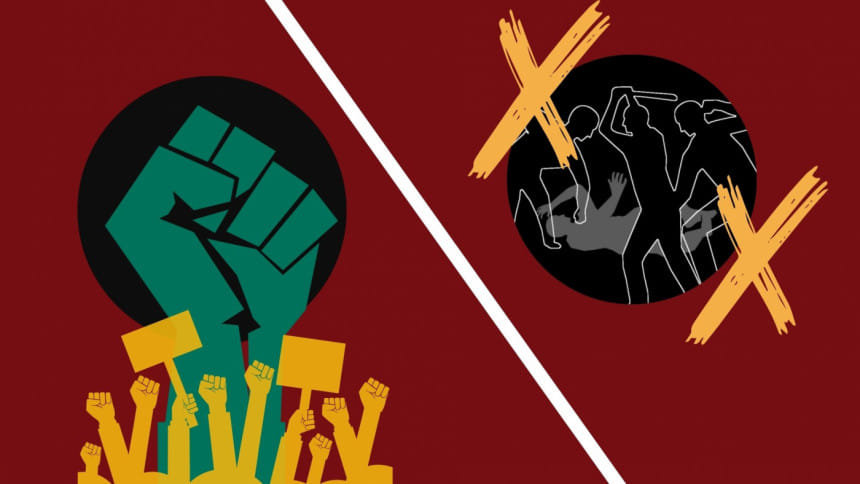Mob justice goes against the spirit of the student movement

In recent weeks, our country has echoed with the triumphant cries of a movement sparked by students demanding the end of a repressive regime. As someone who stood shoulder to shoulder with these courageous individuals, I have felt the euphoria of our shared victory and the weight of our collective responsibility. The triumph was not just a political victory; it was a testament to the power of unity and the enduring spirit of resistance. But as we bask in its aftermath, a disturbing reality is surfacing: the rise of mob justice. Instead of celebrating our newfound freedom with dignity and respect, we are witnessing a troubling shift towards a new form of oppression, one that mirrors the injustices we once fought to eradicate.
I want to be clear: I am not here to belittle anyone or question their commitment to the cause. But as we stand on the threshold of a new era, it is imperative that we address the ways in which our movement's ideals are being compromised. If anything, history has taught us that the most dangerous threat to freedom is not always an external oppressor, but the internal corruption of the very ideals we fought to protect. In the wake of our triumph, some disturbing reports have surfaced—of so-called "representatives" of the movement seizing rooms once occupied by oppressive leaders, of individuals being harassed and assaulted for their attire or political affiliations, of phones being checked and hotels being raided. This behaviour, cloaked in the guise of justice, is nothing more than a new form of oppression.
The essence of our movement was never solely about toppling a tyrannical regime, but about ushering in a new era of inclusivity and respect. Our cause was built on the promise of a society where discrimination would find no refuge and where every voice could be heard without fear. Yet, instead of fostering a culture of tolerance, some of us have chosen to perpetuate a different kind of oppression, casting aside the very principles that fuelled our fight. It is crucial to recognise that true freedom is not merely the absence of tyranny, but the presence of equity and respect for all. The shift from people championing the anti-discrimination movement to some of them engaging in acts of mob justice represents a perilous deviation from our original mission. We must confront this shift head-on and reaffirm our commitment to the values that inspired us. I appreciate that the leaders of the anti-discrimination student movement addressed the recent incidents and made it known that these are reprehensible, unacceptable acts.
In a true democracy, criticism should not be equated with betrayal, but embraced as a necessary part of the discourse. To label dissent as support for a discredited regime undermines the very essence of the freedom we sought to achieve. The measure of our success should be found not only in the regime we dismantled, but in our ability to uphold democratic values in the face of new challenges. While it is definitely too early to comment on where we are headed, we must engage in these difficult conversations and keep things in check.
The interim government now faces a pivotal moment. The decisions made now will shape the future of our society and determine whether we won't become the very power we sought to overthrow. It is time for courageous leadership that embraces the full spectrum of democratic principles, including the protection of individual rights and the encouragement of open discourse. The challenge before us is not just to avoid the pitfalls of authoritarianism, but to actively build a society that reflects the highest ideals of justice and equality. This requires more than just symbolic gestures; it demands substantive actions and a commitment to creating systems that promote transparency, accountability, and inclusivity. The revolution was not an end but a beginning—a chance to forge a new path and to ensure that the mistakes of the past are not repeated. True freedom is not a privilege for the few, but a right for all. Power must be used to uplift, not to oppress.
To the student leaders and coordinators who guided us through this historic struggle, I urge you to recognise the immense responsibility that comes with the power we have gained. You have the ability to set an example, to lead with integrity and ensure that the ideals we fought for are not lost in the process of rebuilding. When you first called for action, you sparked a fire within countless students who stood with you, ready to support the cause in any capacity. Now as you reform the political infrastructure, please remember the power and influence you hold over these students, and guide them so they can lead from the front to uphold the rule of law and ensure equity and justice for all. As we navigate this new era, let us remain steadfast in our commitment to the values that united us.
Maisha Islam Monamee is a student of Institute of Business Administration (IBA) at the University of Dhaka and a contributor at The Daily Star.
Views expressed in this article are the author's own.
Follow The Daily Star Opinion on Facebook for the latest opinions, commentaries and analyses by experts and professionals. To contribute your article or letter to The Daily Star Opinion, see our guidelines for submission.

 For all latest news, follow The Daily Star's Google News channel.
For all latest news, follow The Daily Star's Google News channel. 









Comments